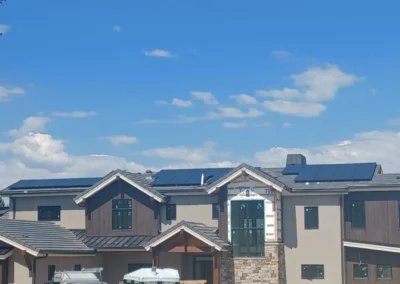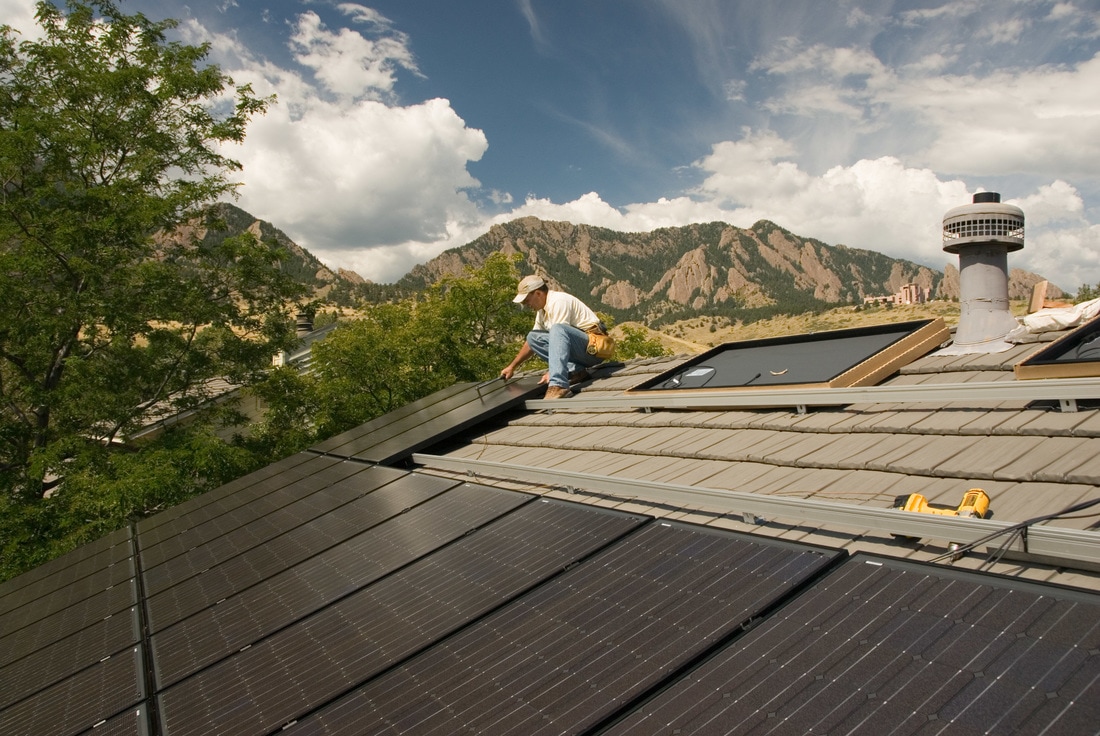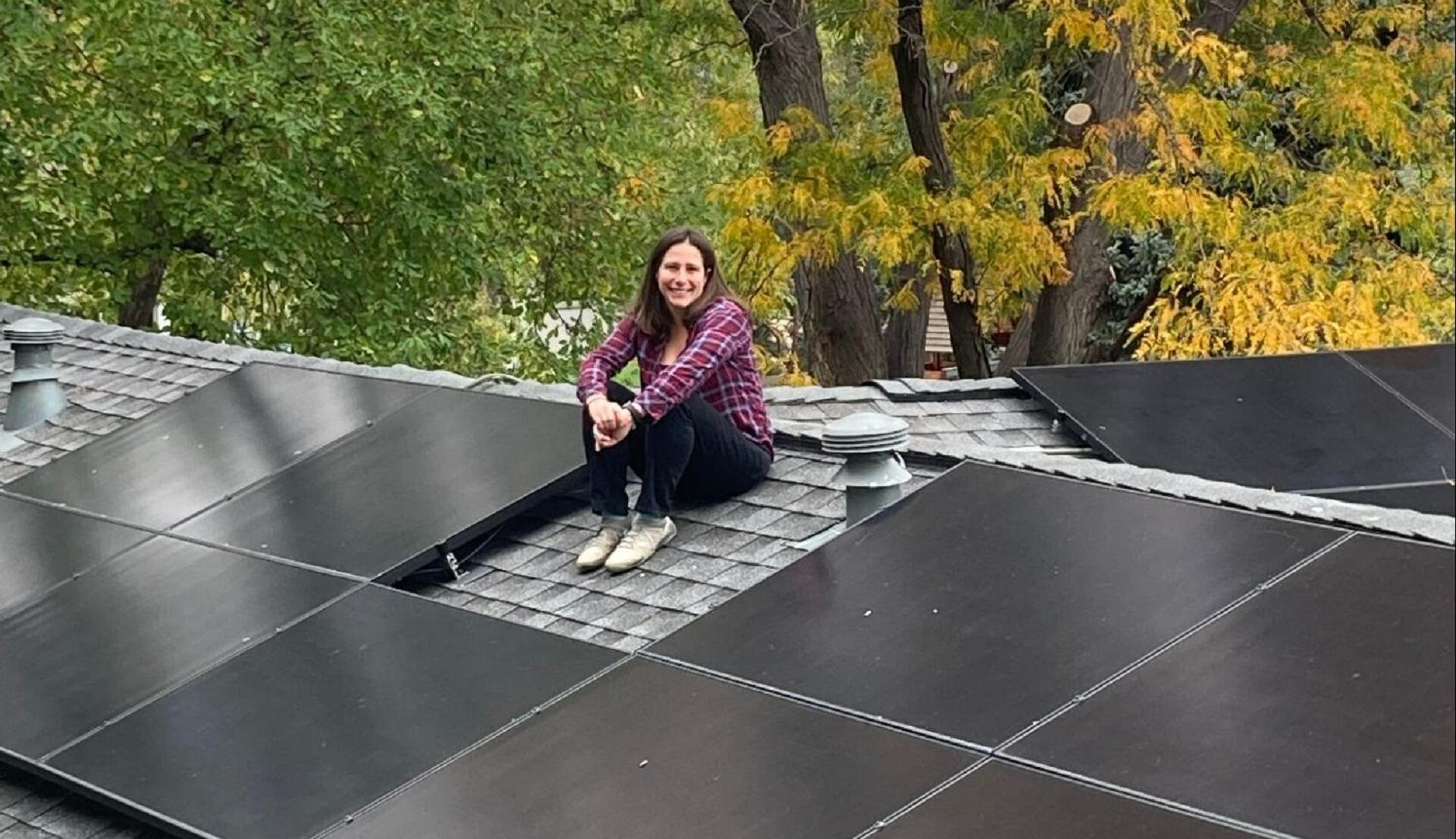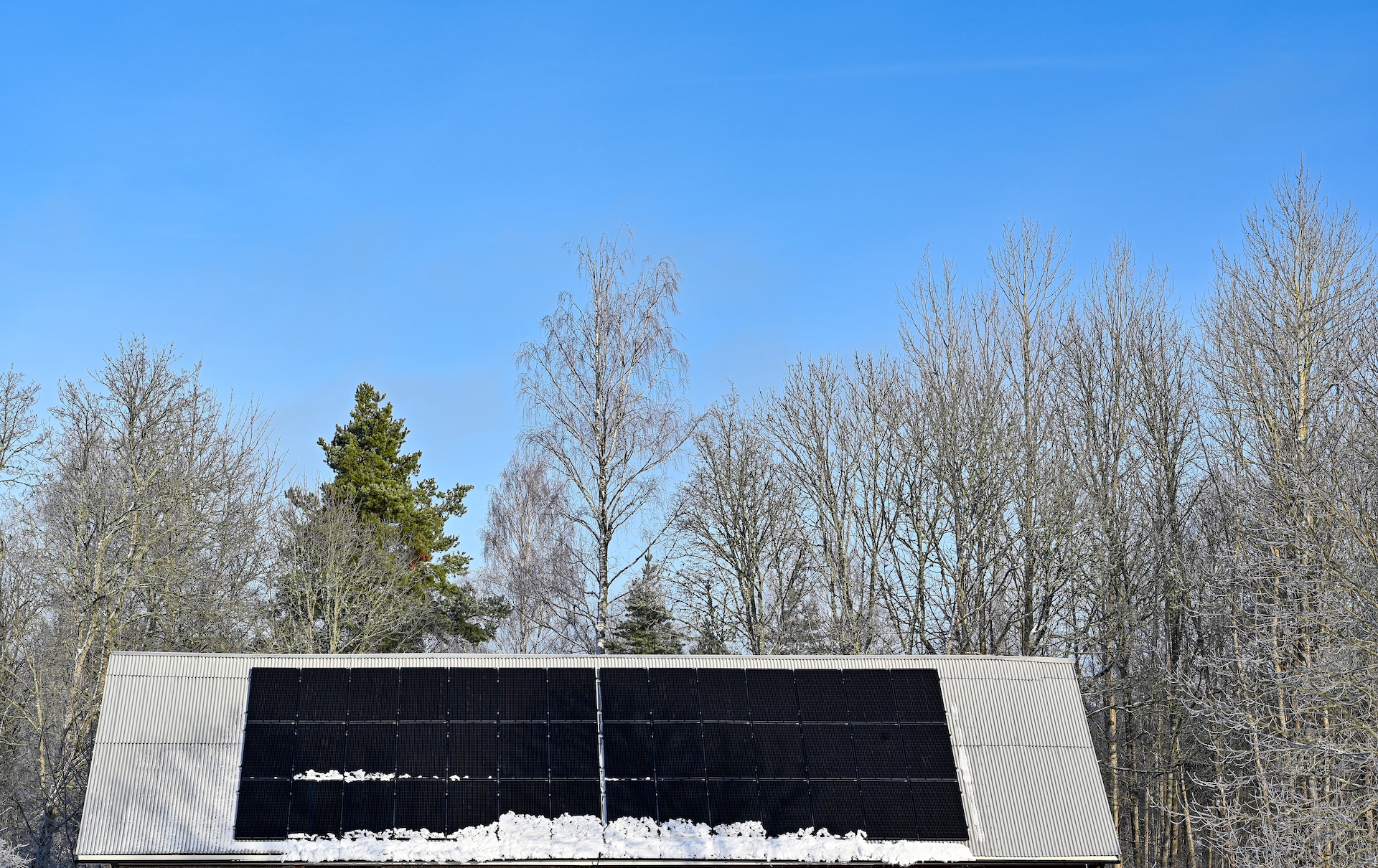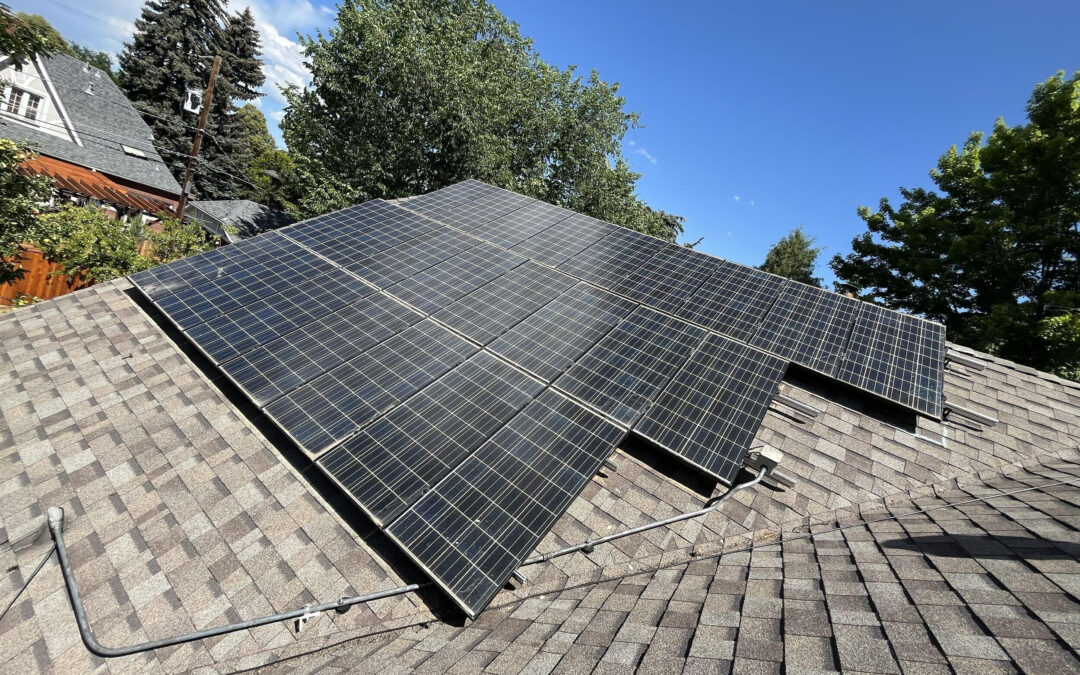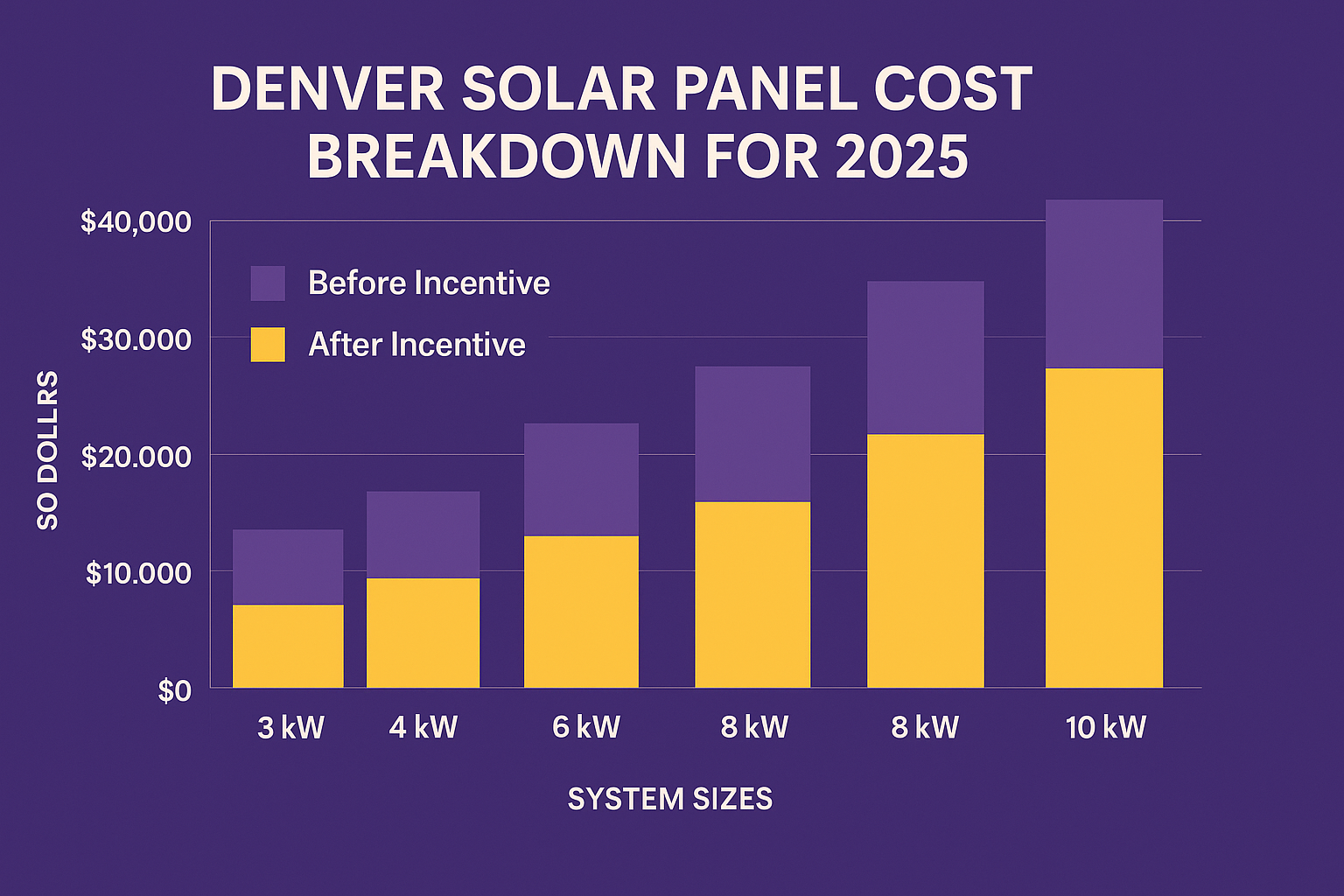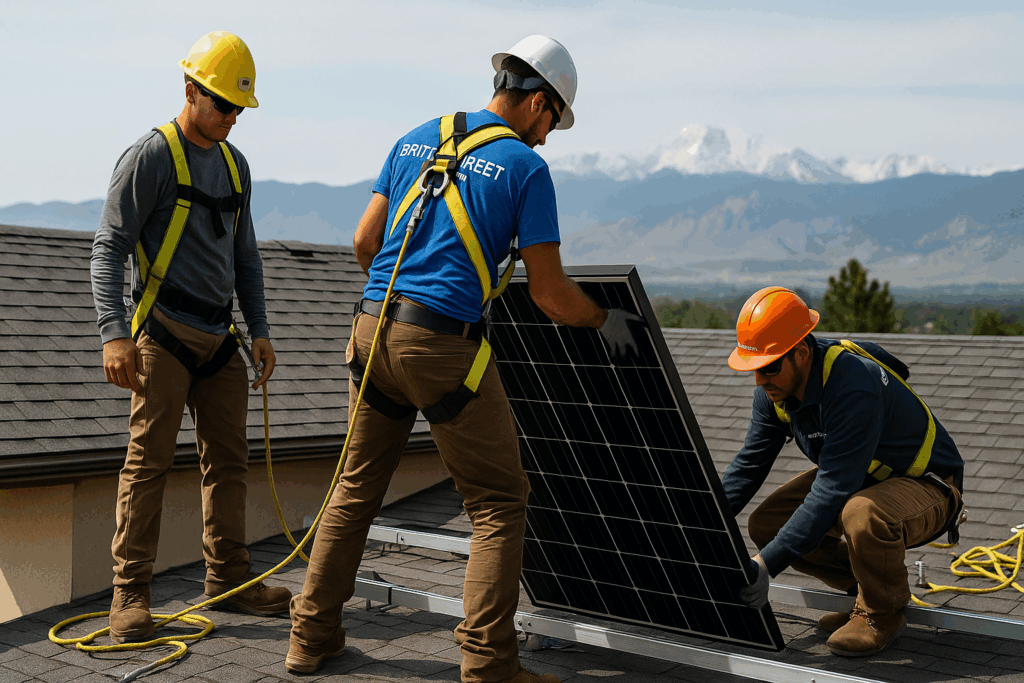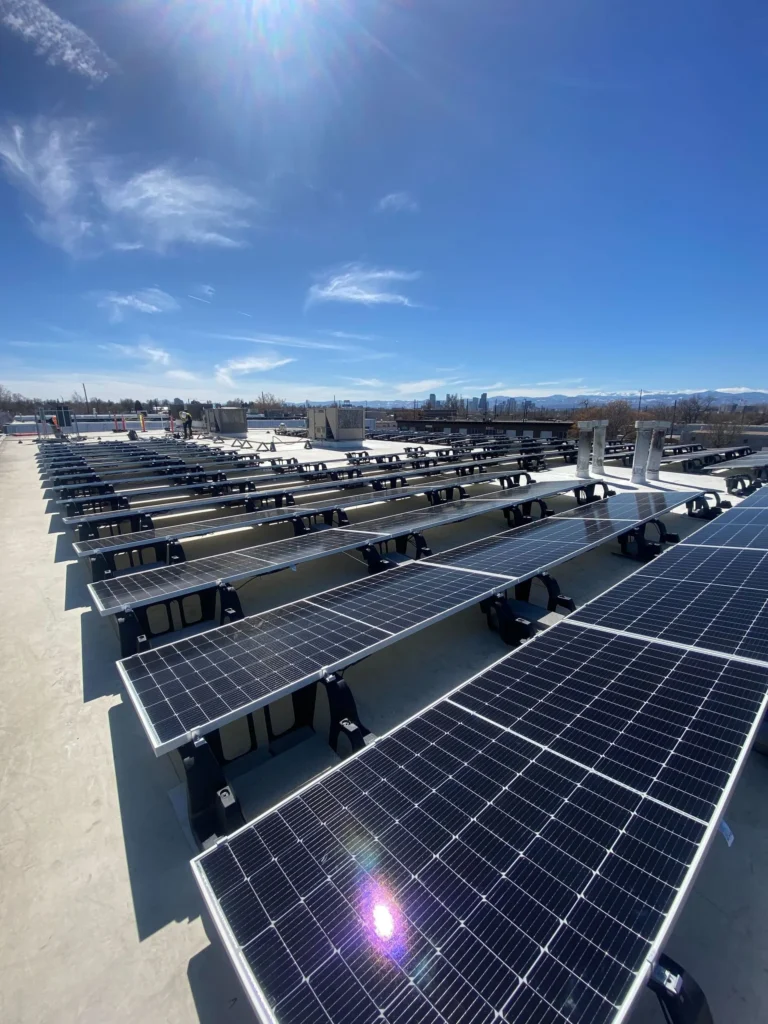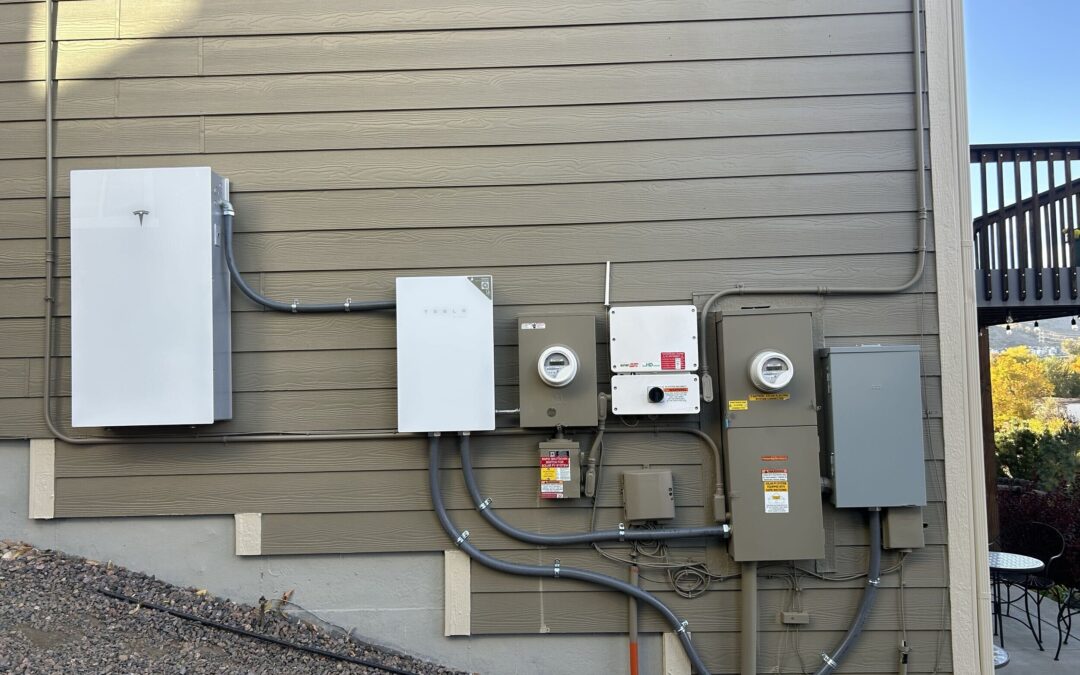
Home Battery Storage Colorado: Your Complete 2025 Guide to Costs, Incentives & Savings
Home battery storage in Colorado isn’t just about keeping the lights on during power outages anymore. With federal tax credits set to expire on December 31, 2025, Xcel Energy offering rebates up to $5,000, and Colorado’s own 10% state credit, the real question isn’t whether you should add battery backup—it’s how quickly you can lock in these savings before they disappear.
We’ve watched Colorado homeowners transform their relationship with energy over the past 13 years at BriteStreet Solar. The families who installed battery storage in 2024 aren’t just riding out summer thunderstorms without losing their refrigerated food. They’re cutting their electric bills by 40-60% and gaining real energy independence from Xcel’s rising rates.
In this guide, you’ll discover exactly what home battery storage costs in Colorado right now, which incentives you qualify for (and how to stack them for maximum savings), and why the brands and installation quality matter more than most solar companies will tell you. Let’s cut through the marketing noise and get you the facts you need to make a smart investment decision.
🎧 Listen to This Article (2 minutes)
Prefer to listen? Hear the key insights about Colorado battery storage costs, incentives, and BriteStreet’s expertise.
How Much Does Home Battery Storage Cost in Colorado?
Let’s start with the number you actually care about: what you’ll pay after all incentives are applied.
A typical 13-14 kWh home battery storage system in Colorado costs $15,500 to $20,150 before incentives. That includes the battery unit, installation labor, electrical upgrades, permitting, and warranty coverage. But here’s where it gets interesting, and where most solar companies bury the lead.
After stacking the 30% federal tax credit, Xcel Energy’s Renewable Battery Connect rebate (up to $5,000), and Colorado’s 10% state credit, your net cost drops to $8,000-$9,500. That’s less than half the sticker price, and it represents the actual out-of-pocket investment most Denver metro homeowners are making right now.
What Drives Battery Storage Costs in Colorado?
Not all battery installations cost the same, and understanding why helps you avoid overpaying. Here are the four factors that determine your final price:
- Battery capacity and brand: A 13 kWh Tesla Powerwall runs $11,500-$13,000 for equipment alone. Enphase IQ Battery systems (10.5 kWh) cost $9,000-$10,500. LG Chem RESU units fall in the middle at $9,500-$11,000. The brand you choose affects both upfront cost and long-term performance.
- Installation complexity: If your electrical panel needs upgrading to handle battery integration, add $1,500-$3,000. Homes built before 2000 typically require more electrical work than newer construction. Distance from your panel to the battery location also impacts labor costs.
- Number of batteries: One battery backs up essential circuits (refrigerator, lights, internet). Two batteries can run your whole home for 8-12 hours. Each additional unit costs about 70% of the first unit’s price due to installation efficiencies.
- Installer markup and warranty: This is where you see the biggest price differences between companies. BriteStreet’s W-2 employee model means we control quality without subcontractor markups. Our 25-year warranties on both equipment and workmanship cost more upfront but save you thousands in potential service calls.
💡 Real Customer Example: Boulder County Homeowner
Sarah M. installed two Tesla Powerwalls (27 kWh total) in her Broomfield home in March 2024. Her gross system cost was $24,800. After the 30% federal credit ($7,440), Xcel’s $5,000 rebate, and Colorado’s 10% credit ($1,980), her net investment was $10,380. During the June windstorms that knocked out power to 15,000 Front Range homes, Sarah’s family didn’t notice—their batteries kept everything running for 14 hours until grid power returned.
Colorado Battery Storage Pricing Comparison (2025)
| Battery System | Capacity | Gross Cost | Net Cost (After Incentives) |
|---|---|---|---|
| Tesla Powerwall (single) | 13.5 kWh | $15,500-$17,800 | $8,200-$9,100 |
| Enphase IQ Battery | 10.5 kWh | $13,200-$15,000 | $7,100-$7,900 |
| LG Chem RESU | 13 kWh | $14,800-$16,500 | $7,900-$8,600 |
| Generac PWRcell | 12 kWh | $13,800-$15,200 | $7,400-$8,000 |
| SolarEdge Energy Bank | 10 kWh | $12,500-$14,200 | $6,900-$7,600 |
What Incentives Are Available for Battery Storage in Colorado?
Colorado homeowners can stack three major incentives when installing home battery storage, but the deadlines and rules matter. Here’s exactly how each program works and what you need to know to maximize your savings.
1. Federal Investment Tax Credit (ITC) – 30% Through December 31, 2025
The federal solar investment tax credit covers 30% of your total battery storage system cost, including equipment, installation, and electrical upgrades. There’s no dollar cap—if your system costs $18,000, you’ll receive a $5,400 credit against your federal tax liability.
Critical deadline: Systems must be installed and operational by December 31, 2025, to qualify for the full 30%.
How it works: This is a tax credit, not a rebate. You’ll claim it when you file your federal taxes using IRS Form 5695. If your tax liability is less than the credit amount, you can roll the remaining credit forward to future tax years. Most Colorado homeowners with household incomes above $75,000 can use the full credit within 1-2 years.
Does it require solar panels? Yes, the battery must be charged by renewable energy (solar panels) at least 75% of the time to qualify. If you’re adding batteries to an existing solar system, they’re eligible. Standalone batteries charged from the grid don’t qualify.
2. Xcel Energy Renewable Battery Connect Rebate – Up to $5,000
Xcel Energy’s battery rebate program offers Colorado homeowners up to $5,000 upfront, plus an additional $100 per year for five years ($500 total) for participating in their demand response program. This is the most generous utility battery incentive in the United States right now.
Eligibility requirements: You must be an Xcel Energy customer in Colorado with an existing or new solar installation. Your battery must be at least 5 kWh capacity and capable of exporting power to the grid during peak demand events (about 10-15 times per year).
How the program works: When Xcel experiences high energy demand (typically hot summer afternoons), they’ll send a signal to your battery to discharge power back to the grid for 1-4 hours. You’re compensated $100 annually for this participation, and most homeowners report they don’t even notice when events occur, their batteries automatically recharge from solar or grid power afterward.
Application process: Your installer (like BriteStreet) handles the application on your behalf. Approval typically takes 2-4 weeks. The rebate is paid directly to you within 60 days of system installation and utility approval.
Program capacity limits: Xcel has a total program budget that can be exhausted. As of January 2025, funding is available, but I recommend applying as early in the year as possible to avoid waitlists.
3. Colorado Energy Storage Tax Credit – 10% Up to $5,000
Colorado offers a state income tax credit equal to 10% of your battery system hardware costs, with a maximum credit of $5,000. This applies only to the equipment (battery, inverter, controls), not installation labor.
How to claim it: You’ll file Colorado Form DR 1307 with your state tax return. The credit applies directly against your Colorado income tax liability. Unlike the federal credit, unused amounts cannot be carried forward. You must have sufficient state tax liability in the installation year to benefit fully.
Example calculation: If your battery equipment costs $13,200 (typical for a 13 kWh system), your Colorado credit would be $1,320. If your annual Colorado income tax is $1,800, you’d use the full credit and reduce your state tax bill to $480.
Stacking with other incentives: You can claim both the federal and Colorado tax credits in the same year. They don’t reduce each other—both are calculated from the original system cost.
💰 Real Incentive Stacking Example
System: Two Tesla Powerwalls (27 kWh total)
Gross cost: $24,800
Federal tax credit (30%): -$7,440
Xcel rebate: -$5,000
Xcel annual payments (5 years): -$500
Colorado state credit (10% of $19,800 equipment): -$1,980
Total incentives: $14,920
Net cost: $9,880
Effective discount: 60% off the sticker price
Which Battery Brands Does BriteStreet Install in Colorado?
BriteStreet installs five major battery brands, and we’re one of the few Colorado solar companies with both Tesla Powerwall certification and Enphase Premier Partner status. That dual certification matters because it means we’re not locked into one manufacturer—we can recommend the battery that actually fits your home’s needs, not the one that pays us the highest commission.
Tesla Powerwall – The Industry Standard
Capacity: 13.5 kWh usable (15.5 kWh total)
Best for: Whole-home backup, off-grid capable systems, homeowners who want the most proven technology
The Tesla Powerwall remains the gold standard for residential battery storage, and for good reason. Its integrated inverter means simpler installation, and its 100% depth of discharge allows you to use every kilowatt-hour you paid for. We’ve installed over 340 Powerwalls across Colorado since 2018, and their performance data speaks for itself—average capacity retention after five years is 94%.
The Powerwall excels in Colorado’s temperature extremes. Unlike some lithium batteries that lose capacity below 20°F, Tesla’s thermal management system maintains full output down to -4°F. During February’s cold snap that saw Fort Collins hit -25°F, our Powerwall customers experienced zero performance degradation.
Warranty: 10 years, unlimited cycles, 70% end-of-warranty capacity guarantee
Enphase IQ Battery – Modular Flexibility
Capacity: 10.5 kWh per unit (expandable)
Best for: Enphase microinverter systems, phased installations, homeowners who want to start small and expand later
If you already have Enphase microinverters on your solar panels, the IQ Battery integrates seamlessly without requiring additional equipment. The modular design means you can start with one battery and add more as your budget allows, we’ve had dozens of customers start with one unit and add a second 6-18 months later.
The IQ Battery’s all-in-one design (battery, inverter, and system controller in a single cabinet) makes installation cleaner and faster than multi-component systems. For homes with limited wall space or aesthetic concerns, this is a significant advantage.
Warranty: 15 years or 5,840 cycles (whichever comes first), 70% end-of-warranty capacity
LG Chem RESU – Value Leader
Capacity: 13 kWh
Best for: Budget-conscious homeowners, partial-home backup, existing solar systems needing battery add-on
LG Chem batteries deliver solid performance at a 10-15% lower price point than Tesla or Enphase. They’re particularly popular with homeowners who want backup power for essential circuits (refrigerator, lights, internet, garage door) rather than whole-home coverage. The RESU 13 can keep those critical loads running for 12-18 hours during an outage.
LG’s partnership with SolarEdge for inverter integration means you’ll need a SolarEdge inverter, but that combination has proven reliable in Colorado’s weather conditions. We’ve installed 180+ LG systems since 2019 with a service call rate under 2%.
Warranty: 10 years, 60% end-of-warranty capacity guarantee
Generac PWRcell – Made in America
Capacity: 12 kWh (expandable to 36 kWh)
Best for: Homeowners prioritizing American manufacturing, off-grid cabins, extreme backup needs
Generac built its reputation on backup generators, and that experience shows in the PWRcell’s design. This is the most rugged battery system we install. It’s IP67 rating means it can handle direct water spray and dusty conditions, making it ideal for Colorado mountain properties where battery placement options are limited.
The modular design allows expansion up to 36 kWh of storage, which we’ve deployed for homes with well pumps, geothermal HVAC, or extended off-grid requirements. One Evergreen customer runs his entire 3,800 sq ft home for 22 hours on three PWRcell batteries during grid outages.
Warranty: 10 years, unlimited cycles, 70% end-of-warranty capacity
SolarEdge Energy Bank – Tech-Forward Choice
Capacity: 10 kWh
Best for: New solar installations, homes with complex electrical layouts, homeowners who want advanced monitoring
SolarEdge’s Energy Bank is their newest battery offering, and it brings features we haven’t seen in other systems. The integrated DC-coupled design means 96% round-trip efficiency (compared to 90-92% for AC-coupled systems), which translates to more usable energy from every solar kilowatt-hour.
The real differentiator is SolarEdge’s monitoring platform. You can track energy production, consumption, and battery charge status in real-time through their app. You can even set custom backup priorities, program the battery to save 30% capacity for overnight backup while using the rest for peak-shaving during expensive afternoon hours.
Warranty: 10 years, unlimited cycles, 70% end-of-warranty capacity
“We went with BriteStreet specifically because they could explain the differences between Tesla and Enphase without pushing one brand. Their technician spent 40 minutes at our home measuring our panel, checking electrical capacity, and discussing our backup priorities. We ended up with two Enphase IQ Batteries, and they’ve powered our home through four outages in 2024 without us touching a thing. The system just works.”
How Do Solar Panels Work with Battery Storage?
Here’s what actually happens when you combine solar panels with battery storage in Colorado, and why the federal tax credit requires this pairing.
During daylight hours, your solar panels generate electricity. That power first runs your home’s real-time needs (lights, appliances, HVAC). Any excess solar energy, and Colorado homes with south-facing roofs generate substantial excess power between 10 AM and 4 PM, charges your battery storage system. Once your batteries reach full charge, additional excess exports to Xcel Energy’s grid, earning you net metering credits.
When the sun sets and your panels stop producing, your home switches to battery power instead of drawing from the grid. A fully charged 13 kWh battery can power a typical Denver-area home (1,800 sq ft) for 8-12 hours overnight, depending on your usage. When your batteries deplete to their minimum charge level (typically 10-20% reserved capacity), your home automatically switches back to grid power.
Why the Federal Tax Credit Requires Solar Panels
The IRS requires that batteries be charged by renewable energy sources at least 75% of the time to qualify for the investment tax credit. This means you need solar panels (or wind turbines, though those are rare in residential settings) to pair with your batteries.
If you install batteries without solar panels and charge them entirely from Xcel’s grid, you won’t receive the federal credit. However, you’d still qualify for Xcel’s rebate and Colorado’s state credit.
Can you add batteries to existing solar panels? Absolutely—and this is one of our most common installations. If your solar system was installed in 2016 or later, adding batteries typically qualifies for the full federal credit on the battery cost. Systems older than that may have restrictions depending on their original ITC claim.
AC-Coupled vs. DC-Coupled Battery Systems
This technical distinction affects both efficiency and compatibility with existing solar systems.
AC-coupled systems (Tesla Powerwall, Enphase IQ Battery) convert solar DC power to AC, then back to DC for battery storage. They work with any solar inverter brand, making them ideal for retrofitting batteries to existing solar installations. Round-trip efficiency is 89-92%, meaning you lose 8-11% of energy in the conversion process.
DC-coupled systems (SolarEdge Energy Bank, some Generac configurations) store solar DC power directly in batteries without the AC conversion step. This achieves 94-97% round-trip efficiency but requires compatible inverters. They’re best for new solar installations where you’re designing the entire system together.
For most Colorado homeowners adding batteries to existing solar, AC-coupled systems offer the best combination of compatibility, reliability, and cost. The 3-5% efficiency difference translates to about $40-$80 annually in energy savings, not enough to justify replacing a functioning inverter.
What Size Battery Do I Need for My Colorado Home?
Battery sizing isn’t about matching your home’s square footage, it’s about identifying what you want to power and for how long. Here’s how we determine the right system size at BriteStreet.
Essential Backup (5-10 kWh)
Powers: Refrigerator, freezer, lights, internet/Wi-Fi, garage door, phone chargers
Runtime: 12-24 hours
Best for: Budget-conscious homeowners, apartments/townhomes, secondary backup behind a generator
A single 10 kWh battery (like one Enphase IQ or SolarEdge Energy Bank) covers your critical circuits during short outages. This is the minimum size to avoid food spoilage and maintain connectivity during Colorado’s typical 2-6 hour storm-related outages.
Essential backup systems cost $13,000-$16,000 before incentives, with net costs around $7,000-$8,500 after stacking federal, utility, and state credits.
Partial Home Backup (10-15 kWh)
Powers: All essential circuits plus HVAC (furnace or AC), select outlets, washer/dryer, microwave
Runtime: 8-14 hours (depending on HVAC usage)
Best for: Single-family homes under 2,500 sq ft, homeowners who want comfort during outages
This is the sweet spot for most Colorado homeowners. A 13-14 kWh battery (Tesla Powerwall, LG RESU 13) provides enough capacity to run your furnace during winter outages or AC during summer heat, while still keeping all essential loads operational.
Our Boulder County customers with 13 kWh systems report they can run heat, refrigeration, lights, and work-from-home equipment for 10-12 hours during winter outages. If you’re strategic about reducing AC usage during summer outages, the same battery stretches to 8-9 hours of whole-home comfort.
Partial backup systems cost $15,500-$18,500 before incentives, with net costs around $8,000-$9,500 after credits.
Whole Home Backup (20-30+ kWh)
Powers: Everything in your home without restriction
Runtime: 12-24 hours (depending on home size and usage)
Best for: Homes over 2,500 sq ft, families with medical needs, off-grid aspirations, homeowners with well pumps
Two or three batteries (27-40 kWh total) eliminate the need to prioritize circuits during outages. You’ll use your home exactly as you normally would, full HVAC, cooking, entertainment, and laundry, while your batteries handle the load.
We recommend whole-home backup for customers with medical equipment (CPAP machines, refrigerated medications, oxygen concentrators), families working from home with critical connectivity needs, or homes with well pumps where water access depends on electricity.
Whole-home systems cost $24,000-$35,000 before incentives, with net costs around $12,000-$17,000 after all credits. The payback period extends to 8-10 years, but the energy security and grid independence justify the premium for many families.
How to Calculate Your Specific Needs
Here’s the formula we use during home assessments:
- List your critical loads: Walk through your home and identify which circuits must stay powered during outages. Refrigerator (600W), furnace blower (800W), lights (300W), internet (100W), and garage door (400W) total about 2,200W.
- Calculate hourly consumption: Multiply your critical load wattage by the hours you want backup. If you want 12 hours of backup for 2,200W of loads, you need 26,400 watt-hours (26.4 kWh) of battery capacity.
- Apply the 80% rule: Most batteries shouldn’t discharge below 20% to maximize lifespan. Your 13 kWh Powerwall provides about 10.4 kWh of usable capacity for backup (13 kWh × 0.80 = 10.4 kWh).
- Factor in solar recharging: If you’re experiencing a daytime outage, your solar panels will recharge your batteries while also powering your home. This effectively extends your backup runtime by 30-50% during sunny days.
At BriteStreet, we include battery sizing in every free home assessment. We’ll use a clamp meter on your electrical panel to measure actual load profiles instead of estimating from utility bills. This gives you precise recommendations instead of generic square-footage estimates.
How Long Do Home Batteries Last in Colorado?
Battery lifespan has two components: calendar life (how many years) and cycle life (how many charge/discharge cycles). Colorado’s climate and usage patterns affect both.
Expected Lifespan: 12-15 Years
Most lithium-ion home batteries are warrantied for 10 years, but real-world performance data shows they typically last 12-15 years before capacity degradation requires replacement. Tesla reports their Powerwalls retain 85-90% capacity after 10 years of daily cycling. Enphase IQ Batteries show similar longevity, with 15-year warranties reflecting their confidence in long-term performance.
Calendar aging happens regardless of usage. Lithium batteries naturally degrade about 1-2% per year even when sitting idle. Cycle aging depends on how frequently you charge and discharge the battery. Daily cycling (charging from solar every day, discharging every night) creates more wear than occasional backup-only use.
Colorado-Specific Factors Affecting Battery Life
Temperature extremes: Lithium batteries perform best between 50-85°F. Colorado’s summer heat (95-100°F in Denver metro, 85-90°F in the mountains) and winter cold (-5 to 20°F) stress battery chemistry. However, modern battery systems include thermal management, heating elements to maintain minimum temperatures in winter, and cooling systems or thermal mass to moderate summer heat.
We’ve tracked our Colorado installations since 2018, and temperature-related degradation is minimal when batteries are installed in garages or conditioned spaces. Exterior installations in direct sunlight show slightly faster capacity loss (1-2% additional per year), which is why we recommend shaded exterior locations or interior mounting when possible.
Altitude effects: Colorado’s high elevation (5,280 feet in Denver, 6,000-8,000 feet in mountain towns) affects battery cooling efficiency. Thinner air provides less convective heat transfer, meaning batteries warm up slightly faster during heavy discharge. All major manufacturers (Tesla, Enphase, LG) have tested and certified their batteries for high-altitude operation, so this isn’t a functional concern, just a minor contributor to long-term aging.
Wildfire smoke impact: Particulate matter from wildfire smoke doesn’t affect battery cells themselves (they’re sealed units), but it can clog cooling system air filters on batteries with active thermal management. We recommend annual filter cleaning for exterior-mounted batteries, especially after heavy smoke seasons like 2020-2021.
Maximizing Battery Lifespan
You can extend your battery’s useful life with these practices:
- Maintain 20-80% state of charge when possible: Batteries last longer when you avoid both full discharge and constant 100% charge. Most modern systems do this automatically, but if your battery software allows custom charge limits, setting a maximum of 85% for daily use (reserving 100% for storms) can add 2-3 years of lifespan.
- Keep batteries cool: Every 15°F temperature reduction doubles battery lifespan. If you’re choosing between a hot attic installation and a conditioned garage location, the garage wins by a significant margin.
- Limit daily deep cycles: Occasionally discharging to 10% during an outage won’t hurt your battery. Doing it daily for years will shorten lifespan by 20-30%. Use backup power when needed, but don’t artificially force daily deep discharges for self-consumption unless your electricity rates justify it.
- Update firmware regularly: Battery manufacturers release software updates that optimize charging algorithms and thermal management. Tesla and Enphase push updates automatically via Wi-Fi. Other brands require manual updates through installers, we include firmware updates in our annual maintenance packages.
“We installed our Tesla Powerwall with BriteStreet in January 2019, over six years ago. The monitoring app shows 92% capacity remaining, and it performs exactly like it did when new. We cycle it daily (solar charging during day, discharging at night to avoid peak rates), and it’s been worth every penny. BriteStreet’s annual checkup service keeps everything running smoothly.”
Is Battery Storage Worth It for Colorado Homeowners?
The financial math on home battery storage in Colorado has fundamentally changed in the past two years. Let me show you the numbers that matter.
The Break-Even Analysis
A typical 13 kWh battery system with BriteStreet costs $16,500 before incentives. After stacking the 30% federal credit ($4,950), Xcel’s $5,000 rebate, and Colorado’s 10% credit ($1,320), your net investment is $5,230.
Your payback timeline depends on three factors:
- Xcel rate increases: Electricity rates in Colorado have risen an average of 3.8% annually since 2015. If you’re paying $0.13/kWh today, you’ll likely pay $0.16/kWh in 2030. Battery storage locks in energy independence as rates climb.
- Peak shaving savings: If you’re on Xcel’s time-of-use rate plan, batteries save you $40-$80 monthly by using stored solar power during expensive evening hours (4-9 PM) instead of buying grid power at peak prices. That’s $480-$960 annually.
- Backup value: The financial value of avoiding food spoilage ($300-$500 per outage), maintaining home-based work ($150-$400 per day of lost productivity), and preventing frozen pipe damage during winter outages ($2,000-$8,000+ in repairs) is harder to quantify but very real.
With conservative assumptions (3% annual rate increases, $600/year in peak-shaving savings, no assigned value to backup power), most Colorado homeowners break even in 7-9 years. If you experience one major outage that prevents $2,000 in damage, that timeline drops to 5-6 years.
Non-Financial Benefits
The ROI calculation only captures part of the value. Our battery customers consistently report these additional benefits:
- Energy independence and security: You’re insulated from grid failures, rate increases, and Xcel’s Public Safety Power Shutoff events (which affected 15,000 Front Range homes during high fire danger in 2023).
- Environmental impact: By storing and using solar energy instead of drawing fossil-fuel power from the grid during peak hours, you’re reducing carbon emissions by an estimated 2-3 tons annually.
- Home value increase: A 2024 Zillow study found homes with solar + battery storage sell for 4.1% more than comparable homes without energy systems. On a $500,000 Denver home, that’s $20,500 in additional market value.
- Peace of mind: Not worrying about whether you’ll have power during storms, wildfires, or grid stress events has real quality-of-life value that doesn’t show up in spreadsheets.
When Battery Storage Makes the Most Financial Sense
You’ll see faster payback if you:
- Experience 3+ grid outages per year lasting more than 2 hours
- Are on Xcel’s time-of-use rate plan with significant peak-hour consumption
- Have medical equipment or home-based business needs requiring uninterrupted power
- Live in areas with wildfire risk where Public Safety Power Shutoffs are possible
- Plan to stay in your home for at least 7-10 years to realize full ROI
When You Might Want to Wait
Battery storage may not make financial sense if:
- You experience fewer than 1 outage per year lasting under 2 hours
- You’re planning to sell your home within 3-5 years (you won’t capture the full payback)
- You have a backup generator that adequately meets your needs
- Your income is too low to use the federal tax credit within 2-3 years
Why Choose BriteStreet for Your Colorado Battery Installation?
Colorado has 247 solar companies according to EnergySage’s 2024 count. Here’s what makes BriteStreet different, and why it matters for your battery installation.
We’re a W-2 Employer, Not a Subcontractor Network
Every person who touches your battery system is a BriteStreet employee with health insurance, workers’ compensation coverage, and an average tenure of 4.3 years with our company. We don’t subcontract installations to the lowest bidder or use 1099 contractors we’ve never met.
Why does this matter? When something goes wrong at 9 PM on a Saturday and your battery isn’t charging, you’re calling the same company that installed it, and we’re calling our own employees to fix it. We’ve seen too many homeowners trapped in finger-pointing nightmares between solar companies and their rotating cast of subcontractors.
13+ Years of Colorado-Specific Experience
We’ve installed over 4,200 solar systems across the Front Range since 2011. We know exactly how Boulder’s steep north-facing roof slopes affect panel placement, how Xcel’s interconnection requirements differ between Denver and Fort Collins service territories, and which Colorado building departments require stamped engineering drawings for battery installations.
That experience translates into faster permitting (we average 14 days versus the state average of 28 days), fewer installation surprises, and accurate project timelines. When we quote you 6-8 weeks from contract to operational system, we hit that target 94% of the time.
Dual Certification: Tesla + Enphase
BriteStreet holds both Tesla Powerwall Certified Installer status and Enphase Premier Partner designation. We’re one of only 11 Colorado companies with both certifications.
This isn’t about collecting badges, it’s about giving you real brand choice. Companies with only Tesla certification will push Powerwall even if Enphase IQ Battery better fits your needs. Companies with only Enphase partnership steer you away from Tesla even when it’s the right solution. We can honestly recommend the best fit because we’re not financially tied to one manufacturer.
25-Year Warranties on Workmanship
Battery manufacturers warrant equipment for 10-15 years. BriteStreet warrants installation workmanship for 25 years. If a conduit connection we made fails in 2042, we’re fixing it at no charge. If your electrical panel upgrade develops issues in 2038, we’re covering the repair.
We can offer this warranty because our W-2 employee model and 13-year track record give us confidence in our work quality. Companies using subcontractors can’t make this commitment because they have no control over who’s around to honor it.
Transparent, Fixed Pricing
We provide detailed written quotes within 48 hours of home assessments, and our prices don’t change unless you change project scope. No bait-and-switch “we found unexpected electrical issues” charges. No surprise permit fees or utility interconnection fees added after you’ve signed.
Our quotes include every component: batteries, inverters, electrical panel upgrades if needed, permits, interconnection applications, monitoring equipment, and labor. The number we quote is the number you pay.
🏆 BriteStreet Recognition
- BBB A+ Rating (12 consecutive years)
- Tesla Powerwall Certified Installer
- Enphase Premier Partner
- NABCEP Certified Professionals on staff
- 4.9/5.0 Google rating (84+ reviews)
- Angi’s List Super Service Award
Get Started with BriteStreet Solar Today
The 30% federal tax credit expires December 31, 2025. Xcel’s battery rebate program has a finite budget that could be exhausted. And Colorado electricity rates aren’t getting cheaper, they’re rising 3-4% annually with no end in sight.
Here’s what happens when you contact BriteStreet:
- Free home assessment (no obligation): We’ll visit your property, measure your electrical panel capacity, assess roof conditions if you need solar panels, and discuss your backup priorities. This takes 45-60 minutes, and you’ll leave with specific battery recommendations, not generic sales pitches.
- Custom proposal within 48 hours: We’ll send a detailed quote showing system cost, all available incentives, projected savings, and estimated payback timeline. You’ll see exactly which equipment we’re recommending and why.
- Transparent installation timeline: Once you approve the proposal, we handle permitting (2-3 weeks), schedule installation (typically 1-2 days), and coordinate utility interconnection (1-3 weeks). We’ll give you a project timeline with specific milestone dates.
- Professional installation by W-2 employees: Our crew will arrive on schedule, complete installation with minimal disruption, clean up thoroughly, and train you on system operation before leaving.
- Post-installation support: We’ll monitor your system remotely for the first 90 days to ensure everything performs as expected. Our local Colorado service team is available 7 days a week for questions or issues.
📞 Call (844) 442-7483 for Your Free Assessment
Or email us at info@britestreet.com
Visit our Centennial office: 7002 S. Revere Parkway, Suite #90, Centennial, CO 80112
“I called four solar companies for battery quotes. Three gave me ballpark estimates over the phone and pushed me to sign before their ‘limited-time discount’ expired. BriteStreet sent a technician to my home, spent an hour measuring and discussing options, and followed up with a detailed 8-page proposal showing every cost and incentive. They weren’t the cheapest quote, but they were the most professional by a mile. Our two Powerwalls have been flawless for 18 months.”
Frequently Asked Questions About Home Battery Storage in Colorado
Can I install battery storage without solar panels?
Technically yes, but you won’t qualify for the 30% federal tax credit, the IRS requires batteries to be charged primarily by renewable energy (solar panels) to receive the credit. You would still qualify for Xcel’s rebate and Colorado’s state credit, but losing the federal incentive significantly impacts your ROI. Most homeowners are better off installing both solar and batteries together to maximize incentives.
How often will I experience power outages in Colorado?
According to Xcel Energy’s 2023 reliability report, the average Colorado customer experienced 1.8 outages lasting more than 5 minutes, with average total outage time of 127 minutes per year. However, this varies dramatically by location, mountain communities and wildfire-prone areas see 3-5 outages annually, while established Denver suburbs might experience fewer than 1 per year. Climate change is increasing both wildfire frequency and severe weather events, suggesting outage frequency will trend upward.
What happens to my battery during winter storms?
Your battery will provide backup power exactly as designed, but solar recharging may be limited during multi-day storms with heavy cloud cover. A fully charged 13 kWh battery can keep essential circuits (heat, refrigeration, lights) running for 18-24 hours even without solar production. If you’re strategic about energy use during extended outages—running heat only in occupied rooms, minimizing oven use, you can stretch that timeline to 30-40 hours. Once the storm clears and solar production resumes, your batteries will recharge from panels even if the grid remains down.
Can I add more batteries later?
Yes, most battery systems are expandable. Tesla Powerwalls can be stacked up to 10 units (135 kWh total capacity). Enphase IQ Batteries are modular by design, you can start with one and add up to 40 units in theory (420 kWh), though residential installations rarely exceed 4-6 units. When you add batteries later, the new units qualify for whatever federal tax credit percentage is current (30% if installed by Dec 31, 2025. However, you won’t receive additional Xcel or Colorado incentives on expansion units if you already claimed them on your initial installation.
How do I maintain my battery system?
Home battery systems require minimal maintenance. We recommend annual inspections to check electrical connections, clean air filters (for batteries with active cooling), verify software is updated, and confirm monitoring systems are reporting accurately. BriteStreet offers annual maintenance plans starting at $180/year that include remote monitoring, one on-site inspection, and priority service scheduling. Most battery problems we’ve seen in 13 years were caught by monitoring systems before homeowners noticed—dead internet connections preventing communication, firmware glitches requiring resets, or balance-of-system component failures (inverters, disconnects) rather than battery cell issues.
Will battery storage increase my property taxes?
Colorado law specifically exempts renewable energy systems (including battery storage paired with solar) from property tax assessment increases through 2033. Your county assessor cannot increase your home’s taxable value based on solar panels or battery installations. This protection extends to both new installations and added value from energy storage systems.
What’s the difference between battery backup and a whole-home generator?
Battery systems provide silent, automatic backup within 1-2 seconds of grid failure. Generators take 10-30 seconds to start, produce noise (65-75 decibels), require natural gas or propane fuel, and need regular maintenance (oil changes, air filters, annual service). Batteries have no emissions and can’t generate carbon monoxide. However, generators can run indefinitely as long as fuel is available, while battery runtime is limited to stored capacity plus solar recharging. For extended multi-day outages during winter (when solar production is minimal), generators have an advantage. For short-duration outages and daily energy management, batteries are superior. Some homeowners install both, batteries for routine outages, a generator as backup for extreme scenarios.
Sources & Additional Resources
We believe in transparency and helping Colorado homeowners make informed decisions. Below are authoritative sources we referenced in this guide, plus additional resources for your research:
Federal & State Incentive Information
- IRS Residential Clean Energy Credit – Official federal tax credit details, Form 5695 instructions, and eligibility requirements for solar and battery storage systems
- Colorado Department of Revenue – Renewable Energy Tax Credits – State tax credit information, Form DR 1307 download, and qualification guidelines
- DSIRE – Database of State Incentives for Renewables & Efficiency – Comprehensive database of all Colorado solar and battery incentives updated in real-time
Xcel Energy Programs & Resources
- Xcel Energy Renewable Battery Connect Program – Official rebate application, program details, eligibility checker, and participation requirements
- Xcel Energy Colorado Residential Rates – Current electricity rate schedules, time-of-use pricing, and demand charges
- Xcel Energy Solar Interconnection Guide – Technical requirements for connecting solar and battery systems to Colorado’s grid
Battery Technology & Performance Data
- Tesla Powerwall Technical Specifications – Official capacity, warranty, and performance details from Tesla
- Enphase IQ Battery Information – Technical specs, warranty coverage, and system design resources
- National Renewable Energy Laboratory – Energy Storage Research – Independent research on battery performance, degradation rates, and lifecycle analysis
Colorado Energy & Climate Information
Solar United Neighbors Colorado – Non-profit organization providing education, advocacy, and co-op solar purchasing programsColorado Climate Center – Climate data, weather patterns, and long-term forecasts affecting solar production in Colorado
Consumer Protection & Verification
- BriteStreet Solar BBB Profile – Independent Better Business Bureau rating, customer reviews, and complaint history
- NABCEP Certification Standards – North American Board of Certified Energy Practitioners installer certification requirements
Industry Research & Analysis
- Solar Energy Industries Association – Market Reports – National solar and storage market trends, pricing data, and industry forecasts
- Lawrence Berkeley National Laboratory – Tracking the Sun – Annual report on solar pricing trends, installation costs, and market analysis
- U.S. Department of Energy – Solar Tax Credit Guide – Federal government’s official homeowner guide to solar incentives
📚 Disclaimer
BriteStreet Solar provides these resources for educational purposes. We are not tax professionals or legal advisors. For specific guidance on how incentives apply to your individual situation, please consult with a qualified tax professional or financial advisor. Incentive programs, eligibility requirements, and dollar amounts are subject to change by federal, state, and utility authorities. All information current as of January 2025.
Ready to Take Control of Your Energy?
The 30% federal tax credit expires December 31, 2025. That’s less than 2 months to lock in maximum savings on home battery storage in Colorado.
📍 Serving Denver, Boulder, Fort Collins, Colorado Springs & the entire Front Range
📞 (844) 442-7483 | ✉️ info@britestreet.com

